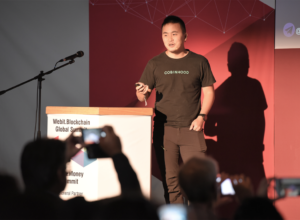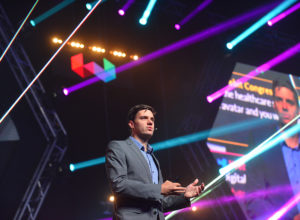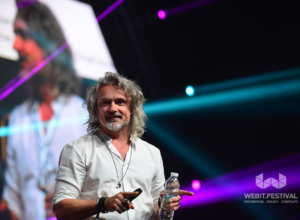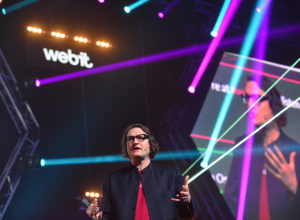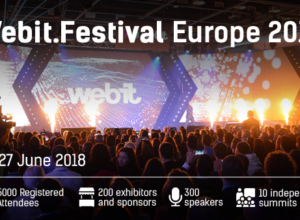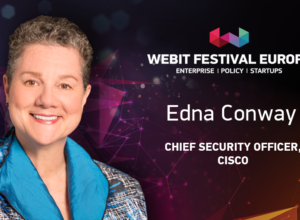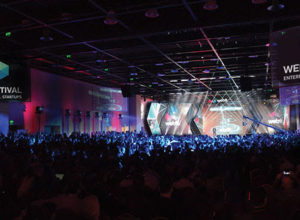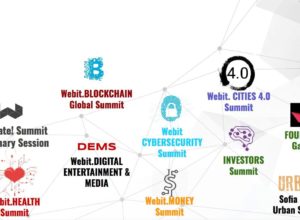Tag: Webit
The DApps Era is coming – the future of Blockchain adoption
The DApps Era is coming
Back in 1991, many of you remember when the websites obsession was huge - the largest companies began with it. The transition towards search engines like Google and Yahoo was more or less smooth until they became viral. The appearance of sharing platforms appeared naturally - youtube, myspace, blogspots, etc. Some of the platforms disrupted and stayed, others disappeared and many, many more appeared. A couple of years ago Messenger,whatsapp and instagram, to name a few - everybody talked about these and while they’re widely used today, the hype over them disappeared. In 2017 - 2018 the most talked about technology advancements are the crypto-blockchain platforms. We are, very naturally, transitioning towards DApps era - or post apps era, role of apps is increasing and becoming more important rather than steady. All of this transition may seem ‘natural’, however, appearance and longevity process is way more difficult. Geoffrey A. Moore’s “Crossing the Chasm” theory applies to basically any sphere. Hsuan explained the technology adoption cycle in the following way: The innovators are about 2,5 % of all the population. The heart of all high tech startups is a product that spawned from a small group of passionate scientists.The early adopters take up about 13,5 %.
This is the ‘chasm’ to which companies pay little attention to once a company is over hyped by the success of market entry. This is the worst place to be, characterized by low scalability, high transaction latency and high transaction fees. The early (34%) and late (34%) majority are the largest part and the most secure phases in a company's development. There are, however, cases when the company fails - the ‘laggards’ as Hsuan calls them - are about 16% of all. Blockchain adoption by companies will be as difficult process as the transition from appearance of apps to their everyday viral usage. It will happen, however.Missed the 2018 edition of Webit.Festival Europe? Don’t miss the 2019! Get your super early bird 2in1 tickets – 2 for the price of 1 here!
Will the blockchain industry change digital advertising?
The crypto market exploded over the last three years. A lot of industries started looking at blockchain as a technology, as to whether it can solve some of their biggest challenges.
Let's look at blockchain:
Blockchain as a technology is still at its infancy. We're still at the hype cycle and blockchain is sitting right next to autonomous vehicles which I don't see happening in the next two or three years and Event-triggered marketing. So as a technology, blockchain might grow into something big like the internet or even bigger, but it might also fade away into some narrow use cases.How can Blockchain improve the Digital Media and advertising landscape?
There are some use cases which are rather obvious: * Fraud detection and prevention * User Identity * Buying and selling inventory, etcCentralization vs. Decentralization
Trust a third party or to use a decentralized approach?Decentralization PROs
* Durability, reliability and longevity - Due to the decentralized networks, blockchain does not have a central point of failure and is better able to withstand malicious attacks. * Process integrity - Users can trust that transactions will be executed exactly as the protocol commands removing the need for a trusted third party. * High quality data - Blockchain data is complete, consistent, timely, accurate and widely available. * Transparency and immutability - Changes to public blockchain are publicly viewable by all parties creating transparency. All transactions are immutable, which means they cannot be altered or deleted.Decentralization CONs
* Trusted 3rd parties - it's not Central vs Decentralized. The advertising ecosystem is based on trusted third parties. These 3rd parties are innovation drivers. * It's too slow - Digital advertising is real-time. RTB standard requires service response in 100ms.There are several examples which already use blockchain in addressing some of digital advertising's biggest challenges.
adChain tries to create a token curated registry of publishers in order to verify and simplify the buying. And papyrus is a decentralized programmatic value management platform aimed to radically improve programmatic advertising stack. All of these solutions are in the making, they are not really ready but they are evolving pretty fast. Several years ago we were talking about mobile apps, then AI, now blockchain. The hype cycles of few years ago were longer and we used to have more time to adapt to them. But now they are becoming shorter and they’re starting to overlap. It wasn’t long long ago that we were talking about programmatic buying. Now it is programmatic buying on a decentralized exchange powered by blockchain.Missed the 2018 edition of Webit.Festival Europe? Don’t miss the 2019! Get your super early bird 2in1 tickets – 2 for the price of 1 here!
Martin Wezowski talks about “WTF – What’s the future” @Webit.Festival 2018
"The future is very important, because we will kind of spend the rest of our lives there. So we better make it really good. :)"
Martin Wezowski is the Chief Designer & Futurist at SAP. He joined Webit to put some perspective on “what is work and what is human in a superhuman future”.Martin, being a fan of the Beatles, started with playing a tune that resembles the style of the iconic band. But later he revealed that the song was created by AI that mimics the Beatles.
"It listens to everything that The Beatles have ever done and makes new songs. It does it so successfully that it has over 2M views on Youtube. That should really raise deep and profound questions."
The main question is WTF - What’s the future?
One example of that is the healthcare."It takes 7-10 years to make a doctor, which gives us a severe shortage of doctors."
With the soon-future-AI, medical help will be in infinite amount everywhere, all the time for everyone. That should also change our minds about what is human work. Nowadays AI can diagnose heart diseases or lung diseases more accurately than humans. Funny enough, humans and AI combined are almost 100% correct. In the 90s we decoded the human genome. It took billions of dollars. Now there is a DNA sequencer for 1000$. What does this mean for research? What does it mean for animal testing?The NOW has never been so temporary as it is today.
Maybe we should start imagining the futures that we want and start creating them, rather than react to what we where we are today because thus we are too late. That might be a little scary because we see jobs disappearing. A hundred years ago almost everybody worked at farming, fishing, forestry. Now it's only about 2%. What did they do? What would they think if you'd tell them: "Most of you will not be in agriculture." What would hey imagine that they will do, accounting? Web development? We are in the same situation today. And it doesn't matter because we will imagine new jobs as they emerge. We can't plan for it. And the real question is this:What to teach kids to become relevant in 30 years from now?
How can we adapt to the change? What new values do we need? The stability of planning is a little bit of fake. The opposite to stability is not instability, it's emergence. It's risk, it's rock'n'roll. To transform, to challenge and take risks. Innovation is sort of rock'n'roll in business and we need more of that.One thing we rely on is the thinking of the 3 horizons.
- Continuous innovation - Ready to consume: Traditional KPIs (key performance indicators) of predictable outcomes and repeatable results and scalable efficiency.
- Adjacent innovation - Ready to Co-innovate: Forecasting your intelligence and resources to the near future, the next, the adjacent innovation where you co-innovate with your partners and/or customers.
- Transformative Innovation - Ready to Inspire: Thinking away from what you can do today and the tools you have. Your vision and thought leadership leads to ideas that you must articulate very clearly so you can have a decent discussion on executive and board level about these ideas.
Help the world run better and improve people's lives.
These two things go to the two sides of the spectrum with 4 dimensions:- The self running company
- Self organizing Business Ecosystems
- Augmented humans
- Purpose Led New Market & Business Models
“Everything from the beginning is an open end and it's up yo us to actually sit down and actually use this methods and look across all the 3 horizons, articulate futures that are desirable where we can play a significant positive role. That's our purpose. And if we do that I actually think we can design futures that we all want to live in. And we should remember to have some fun as well. :)”
Missed the 2018 edition of Webit.Festival Europe? Don’t miss the 2019! Get your super early bird 2in1 tickets – 2 for the price of 1 here!
Rob Wolcott on “Innovating your life” at Webit.Festival Europe 2018
The human experience will change more in the next century than it has in the last ten millennia: Where is the discussion to accompany that change?
Mr. Wolcott returned to Sofia once again for the 10th anniversary edition of the Festival and wowed the audience with his keynote with special topic "Innovating your life". He started with a quote from the one and only Steve Jobs:
If your aspiration is to be a leader, to make mark, to create a legacy in some way than it's going to require doing something different. If you don't you're doing the same thing that everybody else already did. And how would that distinguish you? In Robert's opinion over the next 100 years the human experience will change more than it has in the past 10 000! We will be able to solve challenges that have been intractable for centuries but we will also create threads, some of which humanity has never seen before. But unfortunately our public dialog just isn't up to the task. On the one hand we hear ''The robots will steal our jobs and then kill us all in some kind of impending robot apocalypse". But on the other some people are espousing a coming technology infused nirvana. Clearly the truth is somewhere in the vast between and it's our responsibility to explore it for ourselves. The professor broke down the immense and complicated process of "innovating our life" in 5 simple steps:
"Innovation distinguishes the leaders from the followers."
1. Always keep the mission in mind. What are you doing and how are you doing it?
When we stay focused on our dreams and give them new names like GOALS of MISSIONS they automatically become more realistic and more achievable.2. Ask better questions. We only see the things which we are looking for.
We start asking questions, we start looking for new things, for new clues. Clues that will help us get to the next step, but some of them will inevitably mislead us and we will make mistakes. Then comes the next lesson.3. Seek wisdom in mistakes. The very first reaction when something goes wrong is that we are trying to hide it.
The problem is when something doesn't go the way you expect it perhaps there's a problem with the way you see the world. Back in the late 19th century two researchers named Michelson and Morley did one of the most famous failed experiment in history. They were attempting to prove the existence of the "luminiferous aether". It was the dominant hypothesis of physics in the 19th century to explain the following phenomenon.Sound cannot travel through a vacuum because there's nothing for sound to travel through. Light however, can travel through a vacuum thus there must be something in the vacuum we cannot see.
The scientists did their experiment and when it failed, they couldn't figure out why. They changed the method, tried again, then other scientists tried again but it kept failing and nobody could figure out why. Then came Einstein who said: "Perhaps there's no problem with the experiment, perhaps there's a problem with the way we see the Universe." So when something doesn't go the way you expect it, you should step back and do an after action review: Why that did not work? What can we learn from it?
4. Create option paths. Yes, options come at a cost, but create some.
"As we each create our own paths, we together create the future." - says Mr. Wolcott - and he also adds the question to the public - "On which paths are you … and why?"5. Above all seek meaning. Human beings grow through challenges.
The question for each of us is, as lifespans increase up to even beyond a 100 years, as we encounter the remainder of 21st century, we will all be faced with the question: how should we use this time?"Missed the 2018 edition of Webit.Festival Europe? Don’t miss the 2019! Get your super early bird 2in1 tickets – 2 for the price of 1 here!
Chairman of Huawei joins Webit.Festival 2018!
More global leaders join Webit.Festival Europe 2018!
With over 75% senior attendance among the 6000 people audience from 110 countries - the speakers can only be global leaders and shapers! Join Webit.Festival Europe to meet with them, including Mr. Liang Hua, the newly elected Chairman of Huawei - the world-leading telecommunications provider, just over $90 billion in global annual sales in 2017, Huawei is also the world’s third largest smartphone seller.STILL NOT TOO LATE!
Join the Festival and explore unparalleled business networking
A warm welcome to Thibaut Gregoire, General Counsel, Europe, MasterCard, who joins along with his colleagues - both Vice-Presidents - Mikael Svensson and Louise Holden after the President of Mastercard Europe Javier Perez already joined Webit. Presenting you some of the newly announced speakers of the upcoming Europe's tech, digital economy and policy event for 2018 - Webit.Festival!
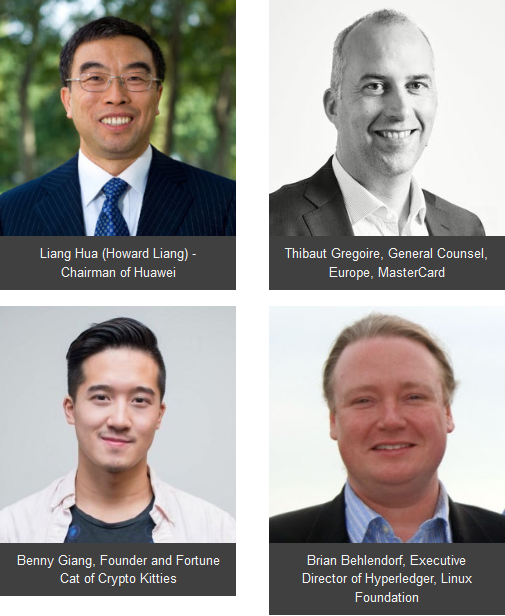 The Blockchain world joins Webit to challenge the future of the decentralized economy! Webit.Festival is the place to involve policy makers, all major tech companies and the blockchain ecosystem to innovate through collaboration!
The Blockchain world joins Webit to challenge the future of the decentralized economy! Webit.Festival is the place to involve policy makers, all major tech companies and the blockchain ecosystem to innovate through collaboration!
 With over 200 exhibitors and sponsors the 10th Webit.Festival is the largest ever European edition, double in size compared to last year.
A warm welcome to Huawei, Red Bull, Google, Amatas, Cogni, Jelurida among the newly joined sponsors and exhibitors of Webit.Fetsival 2018.
With over 200 exhibitors and sponsors the 10th Webit.Festival is the largest ever European edition, double in size compared to last year.
A warm welcome to Huawei, Red Bull, Google, Amatas, Cogni, Jelurida among the newly joined sponsors and exhibitors of Webit.Fetsival 2018.
Interested in exhibiting / sponsoring? Contact us asap!
See you on 26-27 June in Sofia! The Webit Team
Chief Security Officer of Cisco – Edna Conway joins Webit this...
Here you can see a full list of the confirmed speakers at Webit.Festival Europe 2018, while here you can get all the information you need about the tickets for the event. Managing supply chain risk requires a comprehensive approach over the complete product or process life cycle, and Cisco is looking at the potential impact of new technologies such as blockchain and the “internet of things” as part of its solution.Digitization is driving each of us across all industries to make dramatic changes to how we approach customers, products, services, and the always-on, real-time information rich marketplace. This digital economy is gender agnostic. And, it is highly dependent on a connected global ecosystem. The message is clear—no one person, enterprise, industry, government or region can stand alone any longer.
Prior to Cisco, Conway was a partner in an international private legal practice and served as Assistant Attorney General for the State of New Hampshire.“We define the value chain as the end-to-end life cycle for any solution. In order to build trust, you need to understand the risks you are taking, and those risks need to be measured in the language of business.” says Conway
She is recognized domestically (US Presidential Commissions) and globally (NATO) as the developer of architectures delivering value chain security, sustainability and resiliency. Her insight is featured in a range of publications, analyst reports, and case studies, including Forbes, Fortune, Bloomberg, CIO Magazine and the Wall Street Journal. Conway is constantly using her expertise to leverage new tools in an ever-expanding digital arsenal. She has turned her attention to the security potential in blockchain. With the ability to track data through networks, blockchain becomes a highly effective digital ledger, or “passport for the data” according to her.My path to security was built on a foundation of protecting intellectual property; enhanced by a legal background and rich engineering and operational leadership roles afforded to me by Cisco. Each of these opportunities, including leaving a successful legal practice to join Cisco, required faith. Faith in my own ability to learn an entirely new discipline and trust that my colleagues would support me in that effort.
Recognition of her industry leadership includes membership in the Fortune Most Powerful Women community, and awards including: a Fed 100 Award, Stevie “Maverick of the Year Award,” a Connected World Magazine “Machine to Machine and IOT Trailblazer” Award, an SC Media Reboot Leadership Award, a New Hampshire Tech Professional of the Year 2018 Award, and CSO of the Year Award at RSA.“A chain of custody of your data and your actions across the full spectrum of a life cycle adds a degree of integrity we’ve never had the ability to do easily before”
Only today! 50% off from all tickets for Webit.Festival Europe 2018!
Register here and get your ticket
to join Prime Ministers, EU Commissioners and EU top policy makers, global innovators and enterprise executives, Ministers, Mayors, investors, media and Europe's top 200 startups and scaleups - all at Webit.Festival Europe with a special discount of 50% on all tickets with code: GDPR 6000 global experts (67% senior attendance) join Webit from 110 countries.Check who is speaking
Over 200 exhibitors and sponsors join Webit this year. A warm welcome to the group of new partners who join Webit including Microsoft, SAP, Samsung, Fox, Novartis, VISA, UBB, part of KBC Group, Superhosting . BG, VMware, FOX, Turner, Novartis, Bayer, Amgen, Generali to name a few. Special thanks to our General partner MasterCard and our strategic media partners Nova TV and NetInfo.Happy to help.
Should you want to join as exhibitor and sponsor - please contact us.We’ve updated our Privacy Statement
There is so much buzz around the new EU’s General Data Protection Regulation (GDPR)
At Webit we are firmly committed to privacy and data protection and we are happy to confirm that we, too, have taken all necessary steps to ensure [full] compliance with the GDPR. All necessary controls and features are in place so you can continue to use our service with confidence.
Feel free to check out our updated Privacy Statement to understand more about the types of information we may collect, how we use it, and why we request it.
Webit is all about community and empowering your success through connecting you with potential partners, investors and clients from all around the world.
SPECIAL 50% DISCOUNT
We also want to take this opportunity to let you know that Webit is welcoming this new era of data privacy by providing all our subscribers a special "DATA present” 50% off from all tickets for Webit.Fetsival Europe 2018 starting this Friday, 25 May till 29 May.
We release a total of 250 tickets for this special "DATA Present".
Register here
and join Webit.Festival Europe with a special discount of 50% on all tickets with code: GDPR
We collect personal data when you register with us via our website or when participating in our events, exchange personal contacts, etc. We will use your personal information to provide and further improve our services, to ensure the security of our website and information systems, as well as for fraud prevention. We do not share it with other companies or organizations. We send to our customers, partners, participants in our events, subscribers and community our information bulletin about the upcoming events, promotions and free tickets, latest developments, new technologies, meetups, parties, products and services, etc.
